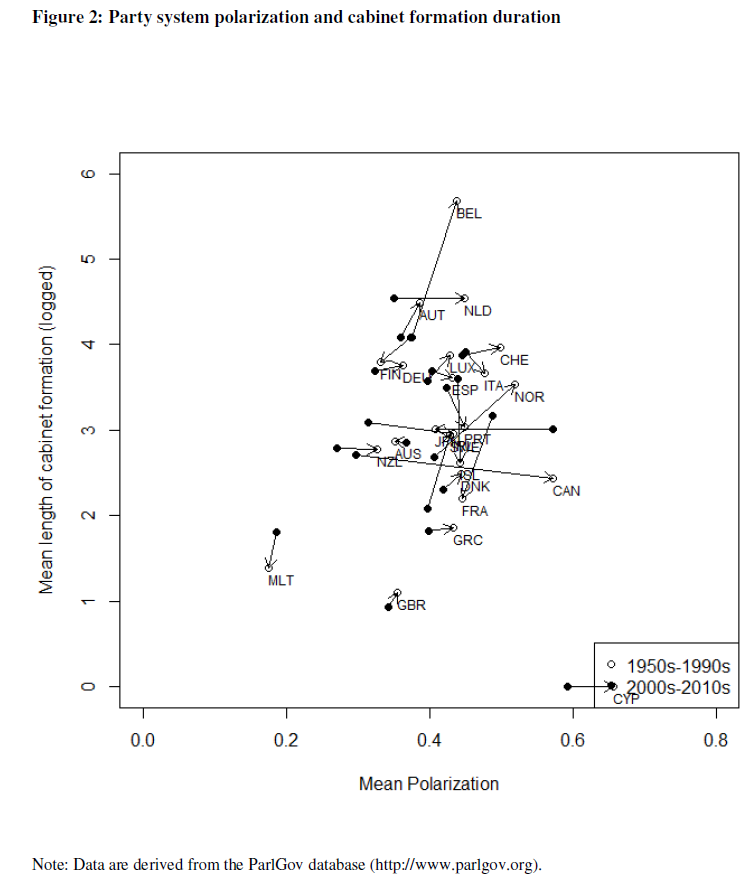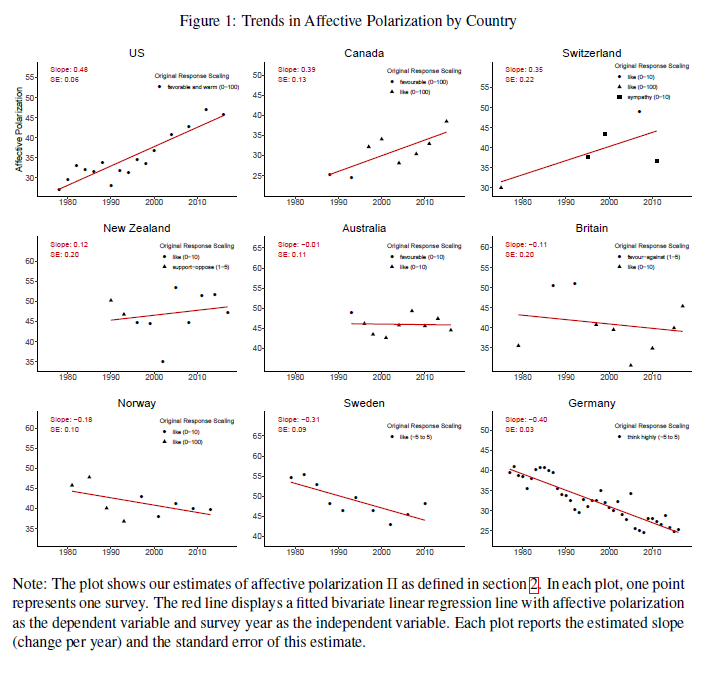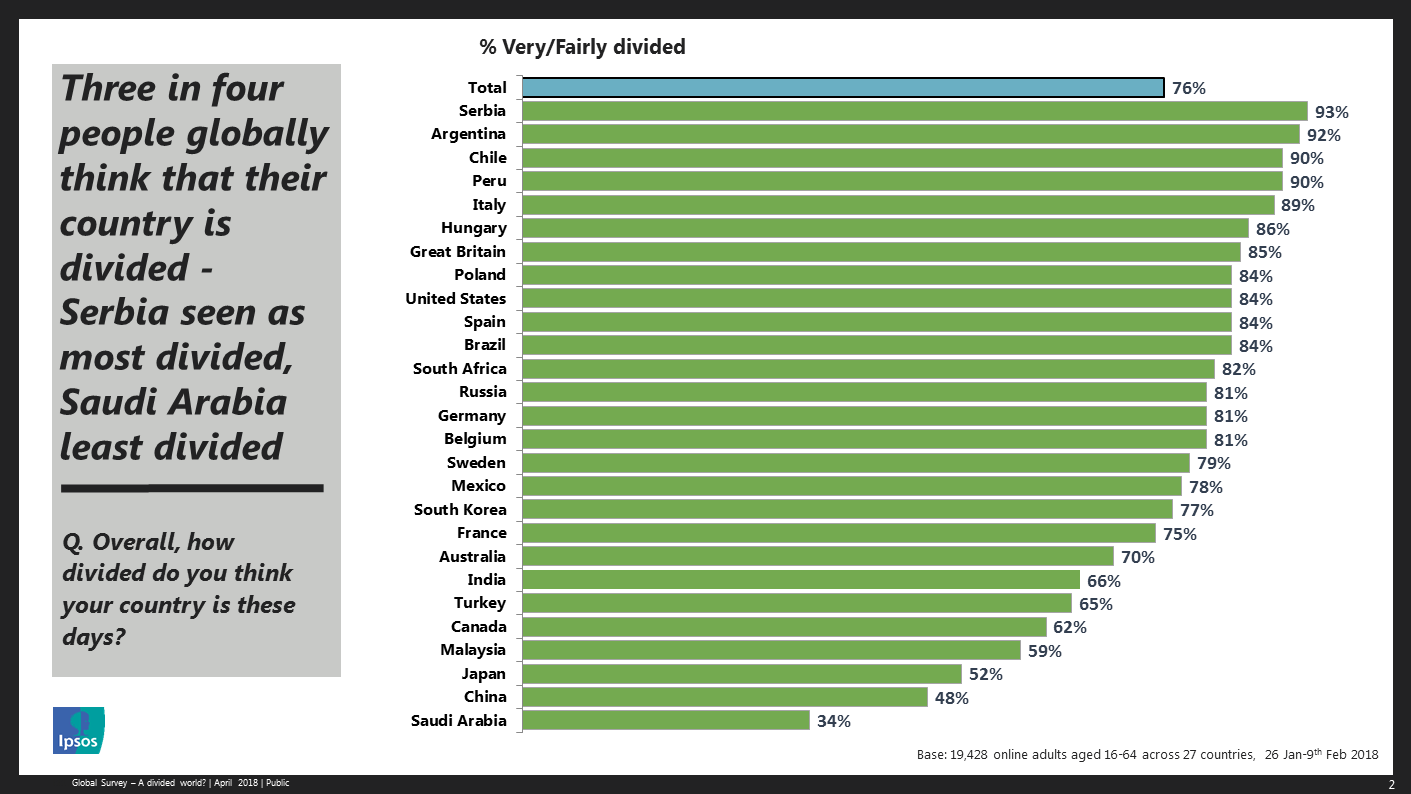The United States is thought of as a divided country based on numerous studies, and the trend seems to be getting worse (more divided). Are there any westernized, Democratic, and free societies that are either considered not highly divided and/or trending towards a unified goal as opposed to opposite ways?
-
4Can you better define what you mean by "divided? Without a specific definition and metric, this seems very opinion-based.– divibisanCommented Oct 7, 2019 at 19:13
-
I would look for things such as a growing concensus amount opposite party members about key issues– spmooseCommented Oct 7, 2019 at 19:16
-
2Do you have a minimum population requirement to rule out single-family microstates?– Peter TaylorCommented Oct 7, 2019 at 19:16
3 Answers
This is not an easy question to answer because there's not a total agreement on how to measure political polarization. The typical conundrum is to rank the examples shown below:
Having said that, measures used in the literature correlate to some extent:
But if you want to pick an extreme, it will probably vary by measure used.
It will also vary on the moment in time chosen. There's a paper (Europe only) that ranked the UK as among the least polarized... in 2009 (see figure A3 and/or table A1 in there). Only Flemish Belgium was ranked as less polarized than the UK in that paper.
Besides the particular numeric measure they chose, they also have some histograms, which do make you wonder how relevant the numeric measure is/was:
Pew has put out a 2018 survey of some EU countries based on various political criteria, with ideology being fairly important, but they don't try to synthesize a single polarization measure from that.
A different paper using more historical data (and a few non-EU countries) puts Malta in that top spot, as well as finding little change over time in that country:
In contrast, the study that Roger found ranks Malta 3rd in the least polarized ranking.
An even newer paper published last month, with a rather limited sample, but with trends over time:
We measure trends in affective polarization in nine OECD countries over the past four decades. The US experienced the largest increase in polarization over this period. Three countries experienced a smaller increase in polarization. Five countries experienced a decrease in polarization.
If they fitted a non-linear curve to the UK, the trend would not be decreasing in recent times... On the other hand Denmark and Iceland (the top two from Roger's answer) are probably not incredibly unique in their relatively low polarization among Northern European countries, all having apparently experienced a decrease in polarization over time.
However, Europe as a whole is perceiving itself as more divided than a decade ago, and this holds for countries like Germany or Sweden too. (Smaller countries like Denmark or Iceland are not included in this latter Ipsos Mori survey either.) Saudi Arabia perceived itself as being least divided now (than 10 years ago) in that survey. If you want to stick to more democratic countries, Japan and India are in that top. Japan also self-perceives that way in absolute terms, but India less so. From the "really Western" countries, Canada tops in both charts (in terms of least division), but do note that they still perceived themselves as more divided than a decade ago: the answer to the "more divided" trend question had 51% of Canadians agreeing, but this is far less than say Germany or the UK (both with 73% agreeing there was more division in their country compared to a decade ago).
So yeah, there can be multiple answers to this depending how one considers the issue (objective vs. subjective measures, exact measure used etc.) There's also the non-trivial problem that countries included in the sample vary quite a bit between such studies. And if you want to consider trends, the time frame is also an issue that can result in different answers.
-
@divibisan: I've added more info, including some papers which do offer actual rankings. However, I think it's disingenuous not to start with the fact that the answer to the extreme value question will probably depend on the exact measure used. The paper from Roger's answer puts Malta 3rd for example, but another paper (last figure in my post), puts Malta first. Commented Oct 7, 2019 at 21:22
-
I posed a question about this here: politics.stackexchange.com/questions/46376/… Commented Oct 7, 2019 at 21:47
This subject is examined in the "How Polarized are Citizens? Measuring Ideology from the Ground-Up" paper from 2018.
Of interest to this specific question is Figure 8: Polarization by Country on page 39, which indicates that Denmark and Iceland have the least amount of polarization of the countries listed.
The paper goes into quite some detail on their methodology for those interested.
-
Malta took 3rd place in this study. (And the US was the most polarized, i.e. last place.) Commented Oct 7, 2019 at 21:04
-
I'm not sure how a country of 300k could all but in jest be compared to a country of 350m. Of course a bigger country will be more divided! Commented Oct 7, 2019 at 21:35
-
5@JonathanReez it takes two people or more for a group to be divided. A village of 300 people can be just as divided (e.g. cattle farmers versus crop farmers; each supporting very different policies) as a country of 300m. There’s a relevant Astérix comic (German title: der große Graben) which deals with exactly that.– JanCommented Oct 8, 2019 at 0:55
-
1@Jan true, but an important point is that over a certain size the factors that lead to polarization are more likely to occur– user19831Commented Oct 8, 2019 at 15:31
-
@JonathanReez: Oh, that's because you've probably never lived there. Back when the country was debating whether or not to legalize divorce a few years ago, Malta was every bit as divided as the US is. And don't even try to get the Maltese started on legalizing abortion. (It's the only EU country where it's still illegal.) Commented Oct 8, 2019 at 17:03
North Korea. Without a doubt.
if you want democracy, you would have to pick a very very small one. Try Nauru or something.
-
Nauru may not have a law authorizing political parties, but they seem to exist informally nonetheless "Nauru does not have any formal structure for political parties, and candidates typically stand for office as independents; fifteen of the 19 members of the current Parliament are independents. Four parties that have been active in Nauruan politics are the Nauru Party, the Democratic Party, Nauru First and the Centre Party. However, alliances within the government are often formed on the basis of extended family ties rather than party affiliation." Commented Oct 7, 2019 at 19:45
-
The question asks "Are there any westernized, Democratic, and free societies [...]" So I think NK is clearly not in that category. Commented Oct 7, 2019 at 19:47
-
@Fizz technically... Communism is very western (invented in a library in the UK)... and communists call themselves freedom lovers just like everyone else. Commented Oct 7, 2019 at 19:56
-
4NK is neither democratic nor free. Nor is it generally considered westernized. Commented Oct 7, 2019 at 20:10






